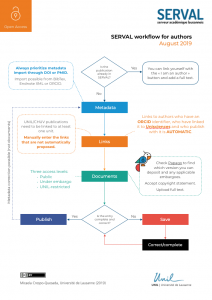We keep striving to make SERVAL more user-friendly and attractive to our researchers. We will proceed with the introduction of (strongly requested) fundamental changes in the application as a prelude to a later simplification of the user interface.
The following features will therefore be pushed to production on Thursday, August 22, 2019:
Decrease in the number of visibility states
Simplification of the states of visibility
The visibility levels of records in SERVAL are reduced to two, “draft” and “public”. The published notices (change from “draft” to “public” status) are immediately visible on UNIL websites (including Unisciences) and on SERVAL public website.

Migration of the previous visibility states
The former “personal” and “UNIL” states become “draft”, while the old “web”, “to validate” and “SERVAL” states become “public”.
Records in the “draft” state are visible to UNIL authenticated users. Authors are therefore invited to publish or delete their notices in the “draft” state.
Halting validation and correction by authors now possible
Institutional validation is now abandoned. From now on, authors will be able to correct the records to which they are linked, knowing that they cannot be deleted once in the “public” state. They therefore have control over it and are responsible for their lists of publications.
Authors are reminded that full texts, once published, cannot be eliminated due to SERVAL’s preservation vocation and our obligations to the German National Library, which assigns permanent identifiers to our documents. However, it is possible to change the visibility of these documents to make them accessible only within UNIL (visibility: “restricted UNIL”).

Data entry agents may also enter and modify the records themselves with the agreement of the authors, but they cannot publish them. This right is reserved to authors.
Roles and rights
Authors have the right to read and write all records belonging to them. Only authors can publish a notice. When a notice is created an automatic information message is sent to all persons linked to the notice.
Data entry officers may enter and modify records in draft or public form with the agreement of the authors. They may not publish a notice.
PhD and master thesis are exceptions
UNIL/CHUV theses and dissertations will be an exception to this change, due to their examination copy status, and will always require validation.
Thus, theses and dissertations currently in a “web” and “to be validated” state will be put in a “draft” state. Authors may enter a thesis/thesis, but not publish it. They will submit it for validation.


